As is the case with many kids who grew up in the 80's and 90's, I played many hours of Oregon Trail in the computer labs in elementary school. Some teachers even had to limit how many hours students could spend on that game, so as to make sure we were also playing the other math and language games available.
Now there is a tabletop card game adaptation of the original computer game. It's exclusively available at Target ... and apparently also on Amazon. It retails at $15, but I always seem to see it on sale for $10 or $12. So it's an inexpensive little game.
My seven-year-old proxy-daughter picked out this game for me as a birthday gift. She recognized it from the TV show Teen Titans Go!, which has an episode in which the characters act out the original computer game (and all die, of course). When I asked her what the Oregon Trail is, she responded "Everyone got dysentery.". So I asked if she knows what dysentery is, and she responded "It's where you poop to death." I guess the show has some educational value after all...
More an emergent narrative than an actual game
The game is simple to play. Each player is given a hand of trail cards and supply cards, and there's a stack of "Calamity Cards" that serve as the main challenge for the game. Players take turns playing a trail card from their hand or a supply card. The selected card's trail end must match up with the end point of the trail on the previous card in order for the card to be played. Most trail cards will require some kind of resolution. Some are river fording cards that require the player to roll a die in order to allow the party to proceed past the river or suffer penalties. Some are calamities that require drawing a card from the calamity deck and resolving its effects.
Most calamities can be countered with supply cards, but snake bites and dysentery are instant, unavoidable deaths.
Most calamities are unfortunate effects that require a die roll or a specific supply card to be played. If the effect is not resolved in time, a penalty occurs -- usually the death of the affected player. Some calamity cards (such as the snake bite or ubiquitous dysentery) will even kill a player outright, with no chance to avoid death.
The objective of the game is for the party to successfully pass 50 trail cards to travel from Independence, Missouri to Willamette Valley, Oregon. It's a purely cooperative game, so if any one surviving party member makes it to Oregon, then the entire group (including the dead players) wins the game. [More]
65386274-7868-482c-812c-58c6189114e8|0|.0
Tags:Oregon Trail, history, dysentery, cholera, death, wagon, wagon train, Target, board game, card game, Independence, Missouri, Willamette Valley, Oregon, computer game, Teen Titans Go!, Tales of the Arabian Nights, nostalgia
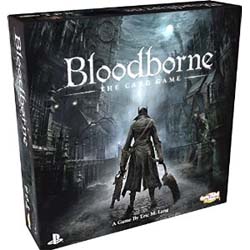
I've written quite a few wishlist and feature proposals for video games on this blog. But today I'm going to do something that I don't think I've done before: suggest ideas for a board game expansion. In this case, I'm going to outline some ideas for my own user-made expansion ("mod"?) for Bloodborne: the Card Game. An official expansion may be due out later this year, so perhaps designer Eric Lang might come across this post and incorporate some of these ideas.
In my review of the card game, I mentioned that the card game adaptation is very simple, that a lot of stuff from the source material seemed strangely absent, and that it almost seemed as though the designers were leaving the door open for some easy expansion material. So I'm going to go ahead and try my hand at creating some of that material.
This isn't the first time I've ever tried my hand at modding a board game, but it is the first time that I've publicly posted my ideas. One of my better ideas (I think) was to try to write a series of national agendas for each of the factions in Axis & Allies, which would be drawn in secret at the start of the game. Only the faction(s) that fulfilled their agendas (and won the war) would be considered victorious. The idea was to make the game more interesting for more than just two players. Probably my most successful mod idea was for the Battlestar Galactica board game (specifically the Exodus expansion). Nobody in our BSG group ever liked playing as Laura Roslin, as we didn't feel that her benefits offset the handicap of having to sacrifice cards from her hand. In order to make her feel more viable, we all agreed that instead of having to discard two cards, Roslin could chose to take a trauma token. This introduced the risk that she might suddenly die (if a blood stain was drawn), but also allowed the player to keep her cards in her hand if they were going to be needed.
So let's see if I can come up with some workable expansion suggestions for Bloodborne...
[More]
7dc68808-f88c-467f-818e-ca7bfda70f64|0|.0
Tags:Bloodborne, Bloodborne: the Card Game, expansion, mod, card game, board game, Hunter's Dream, Chalice Dungeon, Eric Lang, Yharnam, Healing Church, arcane, bloodtinge, Vileblood, executioner, hunter of hunters, rifle spear, Ludwig's Holy Blade, Logarius' Wheel, Rosmarinus, quicksilver bullet, poison knife, blood rock, Augur of Ebrietas, executioner's gloves
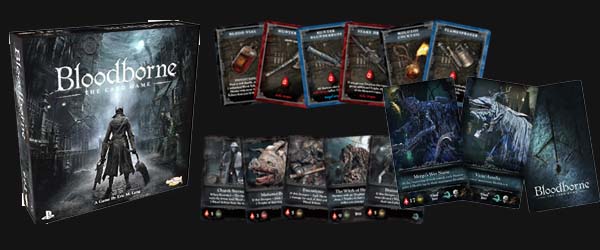
It seems like everything has a board game these days. I wouldn't think that a license like Dark Souls or Bloodborne would warrant a board / card game adaptation, but apparently, I'm just not creative enough. The kickstarted Dark Souls board game is shaping up to be something similar to Descent, and is slated for release later this year. Bloodborne, on the other hand, already has a card game sitting on the shelf of a hobby store near you since last year. A copy of the game showed up under my Christmas tree this year.
Bloodborne: the Card Game Is very easy to learn, and it plays very fast and smooth! This is good, since most of my games are epic-length, 4-plus-hour games that we rarely have time to play. So it's always good to find a new game that people like and which can be played in an hour or less. Our first learning game of Bloodborne (including reading the rules) took about an hour and a half. We had planned on playing a sample round to learn the rules and then doing a mulligan on the game, but we didn't even need to because the game process is so simple that we all grasped the basic mechanics pretty much immediately.
"Selfish Phlebotomy": A game of kill-stealing
The game is a competitive card drafting game in which players sort-of cooperate to defeat a series of monsters, but compete against each other to score the most points. It's basically a Bloodborne-themed reskin of Cutthroat Caverns. Thematically, each player takes on the role of a hunter, the group fights a series of monsters in a Chalice Dungeon, and the hunters acquire Blood Echoes (points) by fighting and killing the monsters. Blood Echoes are directly earned by damaging a monster with a weapon attack. Each player who deals damage to a monster in the round in which the monster is killed also gains one or more trophies (based on the strength of the monster), which are converted to Blood Echoes at the end of the game for scoring.
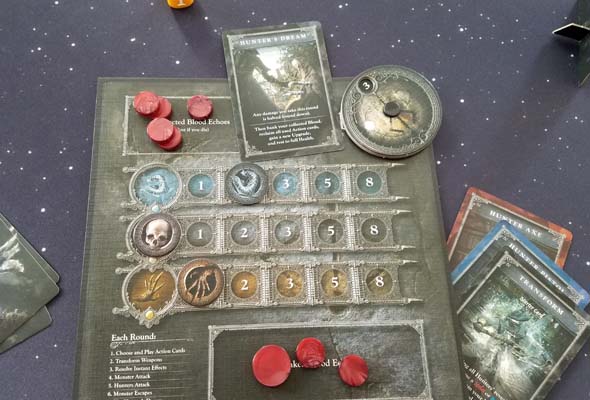
You're playing for Blood Echoes, which are lost if you die - unless you bank them in the Hunter's Dream.
The major mechanical gimmick of this game (and the one that is most inspired by the source material, and which most separates it from Cutthroat Caverns) is that when a player's character dies, that character loses all of his or her collected Blood Echoes, and then resurrects to fight again the next round. However, a player can use an action during the round to return to the Hunter's Dream and bank their collected Blood Echoes so that they cannot be lost. While in the Hunter's Dream, a player can also select new cards to add to his or her hand, and going to the Hunter's Dream is the only way to cycle your previously-played cards back into your hand. The drawback, of course, is that you can't participate in the fight and gain more blood. It's a risk / reward mechanic, and it works very well. [More]
49ef5f43-398b-4b00-87b5-5b2e4cd46b7c|0|.0
Tags:Bloodborne, Bloodborne: the Card Game, semi-cooperative, card game, board game, card drafting, kill steal, Hunter's Dream, blood echoes, Chalice Dungeon, Cutthroat Caverns, Eric Lang
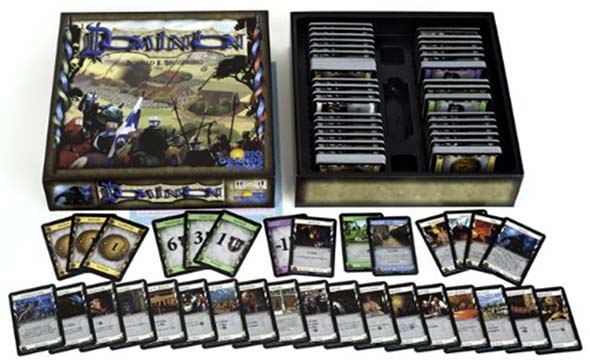
Dominion is a short and simple deck-building card game.
Most of the board games that I like are very long, epic games that take hours to play. Games like Civilization, Battlestar Galactica, and Eclipse can take four or five hours to complete - all of which can still be finished before I'm even done setting up Axis & Allies 1940!. But sometimes, my friends and I don't have hours to burn on a board game, and we need something shorter to play. Fortunately, I have a handful of shorter games as well. And one of the best and shortest games that I play is the deck-building game Dominion.
Dominion is an exceedingly simple game to learn, set up, and play. The basic concept is that each player spends money from his hand to buy kingdom cards to place in your deck. Each kingdom card has special abilities that you can execute when you play it from your hand, and the strategy of the game comes from which cards you buy and how you chain their effects together to maximize your ability to buy victory point cards. Each game will have a group of treasure cards and victory point cards, some of which are distributed to each player to form their starting hands. Each player receives seven "Copper" treasures and three "Estate" victory cards. Shuffle them, and draw five for your starting hand.
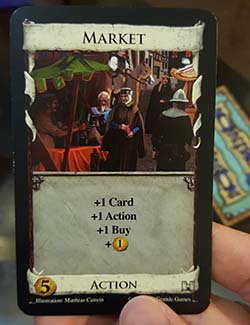
To play the game, simply follow the
directions printed on each card.
When your turn comes along, you can have an Action Phase and a Buy Phase. During the Action Phase, you play any "Action" cards from your hand and resolve their effects. During the Buy Phase, you play any treasure cards in your hand to purchase new cards to add to your deck. Each card has a cost to buy it, which is printed in the bottom corner. Certain cards will grant you additional actions or buys (i.e. the ability to split your treasure to purchase multiple cards of smaller value), and chaining them together efficiently is the key to victory.
There's very few actual rules to learn, since all the actions in the game are resolved by simply reading the effects from the card. The only things you have to learn are some of the game's basic vocabulary (e.g. "action", "buy", "gain", "discard", "trash", "attack", and so on). Once you know what all those words mean in relation to the game (and most of them are self-explanatory), you are ready to play! The result is a simple and elegant game that can be picked-up and played within a matter of minutes.
But this simple game also hides some serious depth and versatility... [More]
e3fc1c69-8f70-4575-a4de-76f7f3fa93a5|0|.0
Tags:Dominion, Rio Grande Games, board game, card game, deck-building game, medieval, renaissance, kingdom, victory point, treasure, shuffle, card protectors, Donald X. Vaccarino
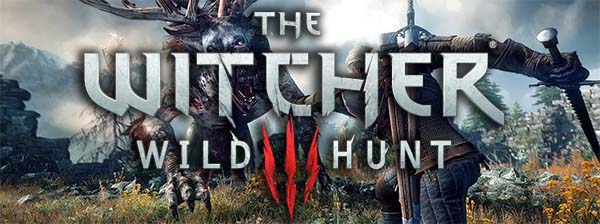
Let me tell you a little story. It's a story of my first few days with The Witcher 3: Wild Hunt. This is a game that I eagerly anticipated. The previews for it were grand, and I expected it to be everything that Skyrim wasn't, and more! I was all ready to give my first 100/100 game review! I spent some time juggling whether to buy the game on PC or PS4. I knew that PC would likely be a better overall experience, with prettier graphics, shorter load times, and the eventual ability to mod. But I decided to go with PS4 instead for two reasons:
- my cousin had pre-ordered the PC version, so I could play his if I wanted to see if it was any better,
- I wanted a good showcase of what the PS4 is capable of compared to high-end PCs.
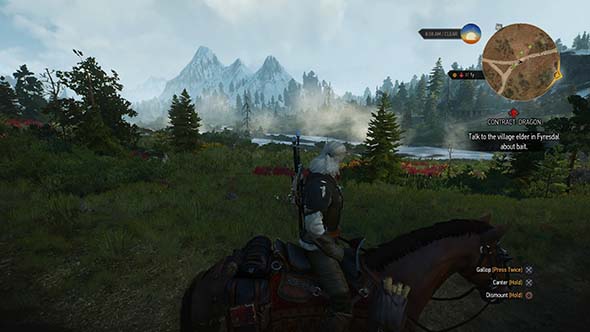
Previews talked up the large, dynamic world, in which your decisions supposedly have major consequences.
Bad first impressions
Oh boy, The Witcher 3 did not make a good first impression with me!
I started the game on the hard difficulty. I had just come off of Bloodborne, so I was in a mindset to be challenged. My first two reactions to the game were fairly negative. Load times seemed long, but then again, the world is supposed to be open and seamless, so loading shouldn't be a frequent necessity. I also had some comfort issues with the controls in the tutorial. I dismissed them as a result of my unfamiliarity with the game and assumed I would get used to it.
The biggest problem was trying to figure out how to reliably heal. I kept losing vitality in small skirmishes, and it just wouldn't recharge. I kept running out of potions, and the game wouldn't let me make more. I had to throw away the empty potion bottle in order to craft more of the healing potions. I assumed this was a glitch.
Does the game require absolute perfection from the player? If so, I wasn't sure if I could handle it. The combat controls are sketchy to say the least. As I got into the game proper, the nagging discomfort that I felt in the tutorial was only amplified as the game threw more enemies at me. Even Geralt's "fast attacks" are lumbering compared to most enemies, and he is fidgety in his movement. Enemies are swift and relentless. It was hard to find an opening for my own attacks without taking damage, and my finger started getting tired from holding down the block command that only sometimes worked. The dodge commands also seemed unreliable, the camera never seemed to focus where I wanted it, and the target lock was nigh useless. It didn't help that the spell and accessory wheel is cumbersome to use.
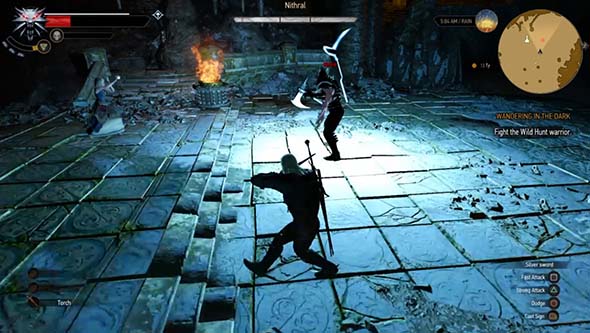
I almost gave up on the game at this first Nithral fight because I had completely forgotten about
the meditate feature, and didn't have any healing items (not that healing items do much).
I eventually hit a brick wall in which all the attrition set in. The sloppy combat mechanics constantly sapped my vitality, and I gradually ran out of healing items which the game was unwilling to provide more of. I ended up in a boss fight with literally half my health gone and no healing items left. My NPC companion spammed lightning spells at him, but these did no damage and only got him stuck in a corner so that I was unable to get behind him and actually attack. To make matters worse, my weapons started breaking, and I had no replacements, and only one repair tool. I tried lowering the difficulty, but it didn't help. It seemed to be a no-win scenario.
I had to reload from an earlier save and tried some other quests to hopefully gain experience, levels, and supplies. I tried exploring the world to gain experience from random encounters, and I sometimes come across mobs of monsters and try to draw the sword and start blocking as I approach. Instead, I go into Witcher sense mode, since witcher sense and block are the same buttons. Often, the enemies get close enough to attack me before the game switches me from witcher sense mode to block mode, and so they get to leech some health away with free hits. This lead to some cheap deaths.

Witcher sense is overloaded to the block button,
leading to some cheap hits while exploring.
I jumped between the quest menu and the map (because the map could only track a single active quest at a time) to try to find a quest in my level range that was nearby. I tried a missing person's case that lead to a warewolf den. The warewolf proved impossible for me to take on, since his health regened faster than I could cause damage. So much for that "doable" quest.
I tried picking up the lowest-level monster contract available (a level 5 one), and died to some kind of porcupine alghoul enemy that damaged me everytime I attacked it. After a reload, I was able to beat it, and for some reason, it didn't damage me when I attacked anymore. Weird. What had I done differently? But my health was low, I was once again out of healing items, and I wasn't even halfway to earning my 5th level yet. The next set of bandits killed me.
I was about ready to give up, as I was getting sick of staring at the long load screen every time I died and not having any sense of learning or improvement. I started squinting at the microscopic text of the menus to desperately find something to help me progress. It was then that I noticed the Meditation option in the menu. It was something that I had forgotten about all this time. I tried meditating for an hour thinking it might restore at least some of my hit points. I figured a full 6 or 8 hours would be required to fully heal. But, much to my surprise, that single hour fully restored my vitality. And it refilled my healing potions. Armed with restored health, some new weapons, and the knowledge that the constant war of attrition that I'd been fighting with the game was unnecessary, I pressed on, defeated the bandits, and managed victories against some other mobs of enemies in the overworld!
Perhaps now I could finally start enjoying the game?
This game certainly has a steep learning curve. But admittedly, most of my early troubles were largely my own fault for not remembering to use the meditation feature... [More]
|

| 12 | | | | | | | 60 | | 11 | | | | | | | 55 | | 10 | | | | | | | 50 | | 09 | | | | | | | 45 | | 08 | | | | | | | 40 | | 07 | | | | | | | 35 | | 06 | | | | | | | 30 | | 05 | | | | | | | 25 | | 04 | | | | | | | 20 | | 03 | | | | | | | 15 | | 02 | | | | | | | 10 | | 01 | | | | | | | 05 |
|